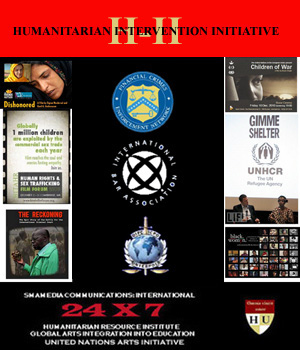World
Antiterrorism Laws: Jurist Legal Education Network.
-----------------------------------
Background Discussion/Response: Lawrence Johnson, Conflict Analyst at
the United Nations, 25 April
2012. [Edited for clarity]
-
Lawrence
Johnson: The rapid political developments in Arab world creates
room for such weapons to be found in the wrong hands.. the
international
community must embrace those changes without overlooking the challenges
they pose towards the security of the human family...
-
Stephen M.
Apatow: Absolutely, it is my view that the War Against
Terrorism, the players and vulnerabilities created in every uprising or
conflict must be viewed with a comprehensive approach. Protection of
civilians must be prioritized and security is critical, this is why the
UNSC has such an important role to play in peacekeeping operations. The
collaboration of countries, with military strategic interests,
manipulating the UNSC (through the abuse of the veto) for those
interests, without regard for
international law, has the potential to not only be counterproductive
but catastrophic.
-
Lawrence Johnson:
True to the point.. It will be very serious to have both the terrorists
and weapons of mass destructions on one table. In as much as we support
the causes of the Syrians and other Arab states citizens, there must be
some kind of serious international scrutinies.. Otherwise we are
slamping terrorism during the day and dealing with the same people at
night.. Nations needs to to be precipitated when intervening.. What
kind of pro-democracy fighters are these who uses suicide bombers?
Syria, Libya and Yemen might remain equally ungovernable for
sometimes..creating more rooms for human sufferings.. The world must
act now and act very fast!
-
Stephen M.
Apatow: 13 months into this Syrian nightmare, without UNSC
action proportional to the challenges presented, is nothing less then
incomprehensible. As for the threat, we are one WMD attack from a
potential nuclear retaliatory strike. The release of the 7/7 mastermind
of the London bombings in February with the potential transfer of WMD
capabilities, provides a broader view of what international challenges
we have on the table for containment, nevertheless the immediate threat
to surrounding countries in the region. The protection of civilians is
a humanitarian sideline, but the conflict demonstrates the importance
of WMD security and containment in any failed state.
-----------------------------------
23 April 2012
Contact:
Stephen M. Apatow
Founder,
Director of Research & Development
Humanitarian
Resource Institute (UN:NGO:DESA)
Humanitarian University
Consortium Graduate Studies
Center
for Medicine, Veterinary Medicine & Law
Phone:
203-668-0282
Email:
s.m.apatow@humanitarian.net
Internet:
www.humanitarian.net
HRI:UNArts:
Humanitarian Intervention Initiative
Url:
www.unarts.org/H-II
H-II
OPSEC
Url:
www.H-II.org

Syria: The War
Against Terrorism and Weapons of Mass Destruction
International
humanitarian and security discussions [1] have recently
transitioned back to CBRN threats in Syria. [2] Topics include an
overview of Syrian Weapons of Mass Destruction, [3] Iraq: Former Regime
Weapons Programs and Outstanding U.N. Issues [4] and reports of weapons
that transitioned from Iraq to Syria prior to the Gulf War. [5]
In the context of
national security, the paper "Terrorism and
WMD In the Contemporary Operational Environment" (US Army TRADOC
TRADOC G2 Handbook No. 1.04, 20 August 2007), outlines the importance
of WMD containment in a failed state:
The
Essential Task:
"Prevent our enemies from threatening us, our allies, and our friends
with weapons of mass destruction.”
“The
United States of America is fighting a war against terrorists of
global reach. The enemy is not a single political regime or person or
religion or ideology. The enemy is terrorism – premeditated,
politically motivated violence perpetrated against innocents.”
“The greater the threat, the greater the risk of inaction – and the
more compelling the case for anticipatory action to defend ourselves,
even if uncertainty remains as to the time and place of the enemy’s
attack. There are few greater threats than a terrorist attack with WMD.”
The
Terrorist Objective:
“Acquiring
weapons for the defense of Muslims is a religious duty. If I
have indeed acquired these weapons (WMD), then I thank God for enabling
me to do so. And if I seek to acquire these weapons, I am carrying out
a duty. It would be a sin for Muslims not to try to possess the weapons
that would prevent the infidels from inflicting harm on Muslims.” --
Usama Bin Laden interview with Time Magazine, December 1998.
“…option
was to destroy the United States by means of decisive
strategic operations with weapons of mass destruction including
nuclear, chemical, or biological weapons if mujahidin are able to
obtain them in cooperation with those who possess them, purchase them –
or manufacture and use primitive atomic bombs or so called dirty bombs.
…”Mustafa Setmariam Nasar, December 2004 jihadist website.
References
- Syria:
International Humanitarian & Security Discussions: Humanitarian
Intervention Initiative. Url: http://www.unarts.org/H-II/ref/syria242012OHCHR.html
- Exclusive: State Department quietly warning
region on Syrian WMDs: Foreign Policy, 24 February 2012. Url: http://thecable.foreignpolicy.com/posts/2012/02/24/exclusive_state_department_quietly_warning_region_on_syrian_wmds
- Syrian Weapons of Mass Destruction: An
Overview: Center for Strategic and International Studies, 2 June 2008.
Url:
- Iraq: Former Regime Weapons Programs and
Outstanding U.N. Issues: CRS Report for Congress, 29 July 2008.
Url:
- Saddam's WMDs were
moved to Syria: Iraqi General Georges Sada Interview: Fox News.
Url:
###
|